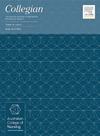“游戏改变者”-教育工作者和管理者对临床实践导师模型的看法
IF 1.7
4区 医学
Q2 NURSING
引用次数: 0
摘要
在全球护理和助产人员短缺的背景下,在竞争激烈的市场中,招聘和留住毕业生已成为当务之急。2023年,为了支持向专业实践项目过渡的毕业生大幅增加,实施了“与智慧合作”临床实践导师的角色,为公共急性和社区卫生设施提供临床支持。目的探讨临床实践导师的新角色与过渡项目经理和教育工作者的经验。方法采用定性描述设计来了解新角色的实施和建立经验。参与过渡计划的教育工作者和管理人员参加了个别访谈和焦点小组。采用归纳和演绎的主题分析方法对管理人员和教育工作者的访谈进行分析。结果169名教育工作者和管理人员参加了个别访谈和焦点小组访谈。新角色最重要的组成部分是冗员和在护理点工作。这个角色在为毕业生提供的支持水平和导师的工作时间上是灵活的。对于那些考虑辞职或退休的有经验的员工来说,这是一个工作机会。与会者强调,新模式是毕业生征聘和留用的一项重要战略,减轻了经常管理大量经验不足的工作人员的资深工作人员的压力。与会者表示,该模式设立了新的支持标准,应继续提供资金,以确保吸引和留住毕业生。本文章由计算机程序翻译,如有差异,请以英文原文为准。
“A game changer” – Educators’ and managers’ perspectives of a Clinical Practice Mentor model
Background
Amid a worldwide nursing and midwifery workforce shortage, recruiting and retaining graduates has become a priority in a competitive market. In 2023, to support a significant increase in graduates undertaking a Transition to Professional Practice Program, the role of the ‘Working with Wisdom’ Clinical Practice Mentor was implemented to provide clinical support across public acute and community health facilities.
Purpose
To explore the experience of the new Clinical Practice Mentor role with Transition Program managers and educators.
Method
A qualitative descriptive design was used to understand the experience of implementing and establishing the new role. Educators and managers involved in the Transition Program participated in individual interviews and focus groups. A process of inductive and deductive thematic analysis was used to analyse the interviews with managers and educators.
Result
Educators and managers (n = 169) participated in individual interviews and focus groups.
The most valued components of the new role were being supernumerary and working at the point of care. The role was flexible in the level of support they could provide graduates and the working hours of mentors. It was a job opportunity for experienced staff who were considering resignation or retirement. Participants highlighted the new model as an important recruitment and retention strategy for graduates and reduced pressure on senior staff often supervising a high number of less experienced staff.
Conclusion
The participants described that the model had set a new standard of support, and funding should continue to ensure the attraction and retention of graduates.
求助全文
通过发布文献求助,成功后即可免费获取论文全文。
去求助
来源期刊

Collegian
NURSING-
CiteScore
2.70
自引率
6.70%
发文量
127
审稿时长
72 days
期刊介绍:
Collegian: The Australian Journal of Nursing Practice, Scholarship and Research is the official journal of Australian College of Nursing (ACN).
The journal aims to reflect the broad interests of nurses and the nursing profession, and to challenge nurses on emerging areas of interest. It publishes research articles and scholarly discussion of nursing practice, policy and professional issues.
Papers published in the journal are peer reviewed by a double blind process using reviewers who meet high standards of academic and clinical expertise. Invited papers that contribute to nursing knowledge and debate are published at the discretion of the Editor.
The journal, online only from 2016, is available to members of ACN and also by separate subscription.
ACN believes that each and every nurse in Australia should have the opportunity to grow their career through quality education, and further our profession through representation. ACN is the voice of influence, providing the nursing expertise and experience required when government and key stakeholders are deciding the future of health.
 求助内容:
求助内容: 应助结果提醒方式:
应助结果提醒方式:


